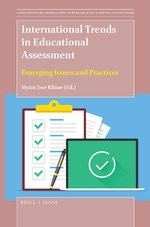educational assessment
Select an item by clicking its checkbox
Date Reviewed: June 17, 2021

Demystifying Outcomes Assessment for International Educators: A Practical Approach
Date Reviewed: November 30, -0001
Few words strike fear in the hearts of post-secondary teachers more than “assessment.” Most faculty in undergraduate and graduate-level education are better-versed in their own specializations than they are in the more administrative aspects of their schools. Assessment often feels like one of those top-down assignments that faculty must add to their workload in order to get ready for the next accreditation visit.
Darla K. Deardorff provides relief from this fear by removing the mystery from the process of assessment. She places it within the healthy context of enabling teachers to see if their work is actually accomplishing what they intend for it to accomplish, and, on a broader scale, if the overall mission of the institution is being achieved. Deardorff takes time to define all of the technical terms so that even those who feel like novices in this domain understand the issues, making it an easy read. The second half of the book is comprised entirely of appendices, full of succinct guidelines on how to create and implement an assessment plan along with examples of tools and processes used at various schools.
The book begins in an engaging manner by using several myths regarding assessment as a foil to make a case for the importance of doing assessment well. The second chapter then looks at thirty frequently asked questions about assessment. Once the reader finishes the first two chapters, he or she is prepared to find out more about the distinctive aspects of international education and learn what goes into creating an effective assessment program – from start, through implementation, and finally to evaluation and revision.
Most of this book would serve as a practical guide for anyone involved in educational assessment, but Deardorff relates the book most specifically to those engaged in international education, by which she means “efforts that address the integration of international, intercultural, or global dimensions into education” (29). This includes schools with study abroad programs, those with a strong international student or faculty presence on campus, or even those that are actively engaged in preparing students to work in other cultures or simply be better global citizens. This adds a level of complexity to the assessment process that traditional models of assessment have not addressed.
While many books on assessment are geared more toward institutional assessment in comparison with other institutions or benchmarks, Deardorff is focused on student learning outcomes and how one knows whether or not they are being achieved. Special attention is given to whether or not methods of measuring these outcomes are both valid and accurate. There is no one-size-fits-all approach to this kind of assessment, but the processes outlined in the book should help any institution create an assessment plan that is both feasible and useful. While it is vital that faculty be heavily involved in this process, a good assessment plan will involve multiple stakeholders, will be integrated into the ongoing program of the school, will make use of both indirect and direct methods of feedback, and will make use of well-planned rubrics.

The Wiley Handbook of Cognition and Assessment: Frameworks, Methodologies, and Applications
Date Reviewed: June 23, 2017
This is a book for assessment professionals; it is the rare teacher in higher education who would be able or willing to get this deep into the weeds of higher education assessment design and deployment. Many of the fifty-two authors contributing to this volume are affiliated with the Educational Testing Service and most seem to be practitioners of assessment for corporations or academic institutions. As the foreword clearly states, the authors are a mix of psychometricians and cognitive psychologists “bringing measurement science into real-world practice” (xx). The book is geared to a multidisciplinary audience, including “educational measurement researchers,” “assessment development practitioners,” and graduate students interested in the measurement of cognition. It is not suitable for classroom teachers interested in exploring course or program assessment.
The greatest value of this volume for the average faculty member at any type of institution will be to provide a lens through which to view the many requests from higher administration to comply with particular types of assessment practices. The first part of the book, which comprises ten chapters, covers frameworks for assessment, and several of the earlier articles in this section are general enough to provide useful insight into assessment protocols. Most of the other two sections, focusing on Methodologies (six chapters) and Applications (seven chapters), are so detailed and technical as to be inaccessible to non-professionals in the field of assessment. A few articles stand apart from this: “Assessing and Supporting Hard-to-Measure Constructs in Video Games” by Valerie Shute and Lubin Wang, and “Conversation-Based Assessment” by G. Tanner Jackson and Diego Zapata-Rivera – both provide interesting alternative visions for approaching assessment and offer promising departures from the typical standardized written assessment.
This volume is full of cutting-edge research on cognition and assessment couched in language inaccessible to those outside the field. The brief “Final Words” section contains a plea that classroom faculty should note: “in order for the work in this Handbook to have the best chance of finding its way into practice, we need to be ambassadors of this research while understanding that it will require time, patience, and functional prototypes to persuade clients and users to believe the scientific and social evidence” (586). This is not the entry-level volume that will allow faculty to help as ambassadors of this sort. This anthology will be of interest primarily to those whose professional focus for research or practice is cognition and assessment in education.
